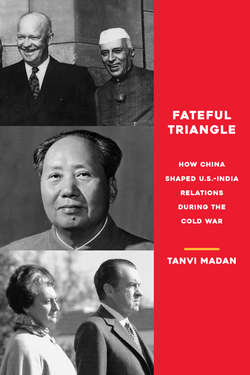Читать книгу Fateful Triangle - Tanvi Madan - Страница 19
На сайте Литреса книга снята с продажи.
What Have They Done for US Lately? (1951–1952)
ОглавлениеIn 1949, K. P. S. Menon had expressed the hope that “the differences in our approach to Communist China would not lead to mutual embarrassment.”273 A couple of years later, it was clear that his hopes had been misplaced. There were consequences beyond a reluctance to give India a seat at the table. India’s China policy, for example, was a key reason for the limited appetite in Congress for aiding India. While many members of Congress publicly attacked foreign assistance broadly, India continued to present a particularly ripe target, especially for members of the China bloc.
Focused on aiding allies, particularly militarily, in their FY1952 aid request, Truman and Acheson halved the amount of aid an interagency assessment suggested for South Asia. Congress subsequently authorized only $54 million of the $65 million requested for India.274 The subsequent Indian refusal to sign the Japan Peace Treaty—primarily, the administration believed, on the grounds that China and the Soviet Union had not been part of the negotiations—did not win it any friends in Washington.275 John Foster Dulles, the US negotiator for the treaty, pointed to Nehru’s belief in the communist propaganda line of “Asia for Asians” as the reason for Indian opposition.276 Even though Nehru publicly rejected this concept, the impression stuck.277 In 1952, Bowles’s push for an expanded $250 million FY1953 aid package for India faltered, in large part because the White House did not think it could get it through Congress.
Bowles unsuccessfully tried to convince administration officials and members of Congress that Nehru had lost any illusions about China and supported the US position on prisoner repatriation in Korea “100 percent.”278 He argued that losing India to communism would be worse than the loss of China, with global, regional, and political consequences.279 He had some support for his advocacy from junior officials on the Near East and South Asia bureau, as well as liberal legislators like Representative John F. Kennedy (D-MA) and Senator Humphrey on the grounds that aid could ensure that India remained noncommunist and secure. But in Congress there was continued criticism that India was not being helpful in Korea. Of the $115 million of assistance the administration requested for India, Congress approved only $45 million—a proportionally greater cut than to the overall aid request.
The apathy toward India was widespread in Congress—where India had not developed a major constituency—and among the public, as well as within much of the administration.280 In some sections, there was downright antipathy. Truman and Acheson understood the potential threat of the lack of economic development in India, but given the administration’s other priorities (Korea, Europe), the lack of an imminent threat (of communists taking over in India) or opportunity (of winning India over), they had no stomach to take on the apathy or antipathy.
Thus Acheson and Mutual Security Agency director Averell Harriman also turned down Bowles’s request in summer 1952 for a special appropriation for India. Given congressional views on India, they were concerned that such a request could adversely affect foreign assistance more broadly. The deputy director of the Mutual Security Agency furthermore asked, “Is it in our best interests to spend large sums to build strength in a neutral India which is thereby able to assume the leadership of the Asian countries?”281
Concerns about communism spreading in India, an NSC-68 reappraisal, and cooperation with India at the UN eventually led the outgoing administration to suggest an increased FY1954 aid package for India to the incoming Eisenhower administration. But the proposal came in the lame duck period of the Truman presidency, and the chances of it getting through unscathed seemed slim.282
